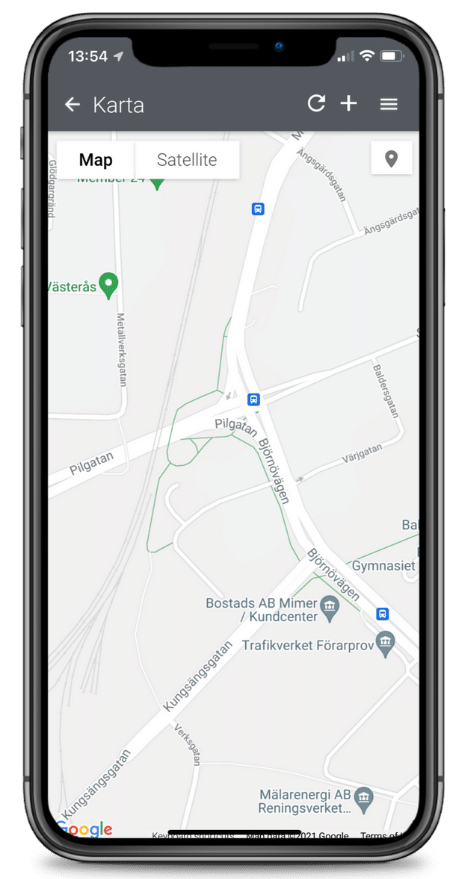General Terms and Conditions – Cloudgruppen Communication
General
These General Terms and Conditions apply when Cloudgruppen Sverige AB, registered in Sweden with organization number 556583-9627 (the “Provider”) provides a communication service (the “Service”) to a corporate customer (the “Customer”). The Provider and the Customer are hereinafter referred to separately as ”Party” and jointly as ”Parties”.
The agreement consists of (i) the order of Services made and any accompaying the terms/agreements that the Customer accepts in connection with such order, (ii) the Provider’s price list applicable at the time of purchase in regard to Service (”Price List”), and (iii) these General Terms and Conditions applicable at the time of purchase. In the event of any discrepancies in the documents, preference shall be given in the order specified above. In addition, other provisions may apply if something else has been agreed upon between the Parties in writing.
The Agreement is individual and only applies to the Customer and the Customer’s provision of the Service to its Users within the Customer’s organization (”User”). The Customer is responsible for ensuring that the Agreement also complies with regard to its Users’ use of the Service.
The Agreement must be signed by a signatory or other authorized person at the Customer. The Agreement shall be considered entered into when the Provider has confirmed the Customer’s order or when the Provider has begun to provide the Service to the Customer.
Service
By using the Service, the Customer is given the opportunity to make and receive calls via application in a terminal, for example, a mobile phone. The Provider provides the Service through a third-party cloud exchange platform (the “Platform”).
The Provider shall provide the Service in a professional manner and in accordance with the Agreement. The Provider has a right to hire subcontractors to fulfil its obligations under the Agreement.
In order for the Customer to access the Platform and use the Services, the Provider provides the Customer with the username, password and PIN code that the Customer uses to access the Platform (“Security Codes”).
If the Customer already has a telephone number with another operator that the Customer wishes to transfer it to the Provider, the Provider may undertake to assist the Customer with transferring of
telephone number, provided that there are no external obstacles. Such assistance may be subject to a separate fee.
The quality of the Service depends on the terminal’s connection to the Internet, which may be different in different locations. The Provider can therefore not guarantee good quality on every occasion in every place. The possibility of emergency calls and location with GPS may, for example, be limited or prevented due to circumstances beyond Provider’s control. The Provider is also not responsible for emergency calls or working in abroad locations or via a third-party application.
The Provider continuously develops its Services and thus reserves the right to modify the Service provided that the Service’s performance or functionality is not impaired to a larger extent. The Provider may also discontinue the Service if the Service is replaced by another service with equivalent technical performance and functionality as the Service. The Provider may also discontinue the Service if the Provider’s subcontractors cease to provide services necessary for the Provider’s provision of the Service.
Customer use and responsibility
The Customer shall use the Service for its own use, which also includes the User’s use of the Service, in accordance with applicable laws and regulations and the Agreement. The Customer is responsible to the Provider for its Users’ use of the Service. Should the Customer’s become aware that the User is in breach of the provisions of the Agreement, the Customer is obliged to immediately demand correction from the User and inform the Provider about such breach.
The Customer or its Users may not use the Service, or allow third parties to use the Service:
- for illegal or unethical purposes or in a manner that causes or may cause harm or other inconvenience to the Provider or third parties, or otherwise contravenes law or government regulations or good practice
- in a way that gives or may give rise to disturbances in the Platform or in the Service, for example through mass calls, unordered calls in high volume or calls that are not humanly generated (i.e. performed by a computer or similar)
- for commercial purposes other than those explicitly foreseen in this Agreement, for example as an interface for interconnection or similar operator activities
- in a manner that infringes the copyright or other intellectual property rights of any third party
- in a manner that exceeds limitations set in this Agreement or, if such limitation is not stated, that the Service is used in a manner that deviates strongly from normal use of the corresponding service, for example, repeated very long calls or abnormally frequent calls.
The Customer must cooperate with the Provider to ensure the Customer’s and the Provider’s security and the Customer must follow the Provider’s instructions regarding the Service. If the Customer
becomes aware that the Service is being used in violation of the Agreement, the Customer shall immediately make a correction and inform the Provider of the violation.
At the Provider’s request, the Customer shall provide the information that the Provider needs in order to provide the Service to the Customer, including information concerning the User(s). The Customer shall without delay notify the Provider of any changes in such information. The Customer is responsible for ensuring that the information is correct and that the Users are informed that information about them has been submitted to the Provider and for what purposes the Provider processes this information. The Customer is further responsible for the Customer’s right to provide the Provider with such information.
If the Provider considers that the Customer’s use of the Service is in breach of the Agreement, the Provider reserves the right to take reasonable action against the Customer. Such actions may consist of restrictions on the provision of the Service, such as completely or partially shutting down the Service. The same applies in the event that information provided by the Customer to the Provider is incorrect, if the Customer is insolvent, enters into liquidation, fails to pay after a written reminder from the Provider or that there is reason to assume that the Customer will not fulfil the Customer’s obligations under the Agreement, or if the authority so requests. If the Service is used for criminal activities, it is the Provider’s policy to report this to the police. The Provider may also be required to share traffic information with the authorities if it is so requested.
The Customer shall compensate the Provider for any damage that the Customer, User or other person or entity for which the Customer is responsible, intentionally or through gross negligence directly or indirectly caused to the Provider.
The Customer shall indemnify the Provider for any costs, expenses, loss of income, fines or damages incurred as a result of claims made against the Provider by third parties due to the Customer’s use of the Service.
Use of terminals
The Customer must store Security Codes in a secure manner so that unauthorized persons cannot access them. The Customer may not copy, interfere with or manipulate Applications used to access the Service.
The Customer undertakes to immediately, at the Provider’s request, disconnect the equipment that causes disturbance in the Platform or in the Service, or causes alleged or feared infringement of third party rights.
The Customer shall immediately notify the Provider, if a terminal is lost or stolen, or if the Customer suspects that an unauthorized person had access to the Customer’s Security Codes. The Customer is
responsible for any unauthorized use of the Service with the Security Codes dedicated to that Customer.
To protect both the Customer and the Provider, the Provider has the right to block Users if the Provider has reason to suspect that the Service is being used by unauthorized persons or in violation of the Agreement. The Provider undertakes to reactivate the blocked User as soon as the Customer confirms that there are no irregularities. The Customer is not entitled to compensation from the Provider due to the terminal being lost or blocked or rendered unusable.
Fees and payment terms
The Customer must pay the fixed and variable fees as stated at the moment of the in the purchase Price List.
For the use of the service in foreign operators’ mobile networks, costs from third parties may be added. It is the customer’s responsibility to ensure that the customer uses national calls when the customer is based in Sweden.
If the Service is used for payment of a good or service, the Customer is responsible for such a purchase. Extra services that the Customer has purchased from the Provider, such as, for example, an extended queue, exchange statistics, international calls or the like, are normally invoiced to the Customer afterwards with the next invoice. If such additional Services have not been paid in due time, the Customer will be invoiced upon the termination of the Agreement.
In the event that the Customer’s use exceeds the normal usage of the Service, the Customer agrees that the Provider will charge the Customer for such extended use.
Invoicing takes place on the fifth every calendar month when the Services have been rendered. Payment must be received by the Provider within twenty (20) days of the receipt of the invoice.
The Customer undertakes to follow any additional payment instructions that the Provider or third party payment service provider requires and is responsible for the accuracy of the information provided by the Customer.
If the Customer pays the invoice later than the due date, the Provider has the right to charge a statutory reminder fee and collection cost, or corresponding fees, as well as default interest according to the Interest Act (1975: 635).
If the Customer does not pay by the due date, the Provider reserves the right, after written notice, to limit or suspend the Customer’s access to the Service. Limitation or suspension of the Customer’s access to the Service shall not take place in the event that the delay is minor or when the Customer has made a correction. As soon as the Customer has made an overdue payment, the Provider
undertakes to make the Service available to the Customer again within a reasonable time. Upon such making available, the Provider is entitled to charge an activation fee to the Customer. Such activation fee is invoiced with the next invoice for the Customer’s use of the Service.
Objections to an invoice, in order to be enforceable, must be made in writing no later than on the due date. Even if an objection is raised, the Customer must pay the invoiced amount no later than on the due date.
Any refund of the Fee to the Customer takes place primarily by settlement against the next invoice and secondarily by separate payment to the bank account designated by the Customer or by payment card.
Liability for Errors and Limitation of Liability
”Error” means that the Customer may not use the Service in accordance with the Agreement. Errors in the Service that are only of minor importance to the Customer and that do not prevent the Customer from using the Service are not considered Errors. The Provider shall remedy the Error in accordance with what is stated in the Agreement.
The Provider is only liable for direct damage caused by the Provider to the Customer intentionally or through gross negligence. The Provider is not liable for indirect damage or loss, such as loss of sales or profit, or other consequential damages. The Provider is also not liable for damage arising from the content of data or other information transmitted through the use of the Service, damage caused by computer viruses or the like, loss, delay or distortion of data or information or the Customer’s possible liability to third parties.
Neither Party shall be liable to the other Party for the performance of obligations which are prevented by circumstances beyond the control of such Party or which such Party could not foresee, including but not limited to, war, natural disasters, lockout or other labour dispute, fire, damage to equipment used, amended government regulations, interruptions in public transport, including, among other things, energy supply and computer viruses in the Service, as well as import and export bans and other bans outside the party’s control, each lasting 30 days or longer.
The Provider has the right to limit the availability of the Service to the extent required by the Provider’s assessment when the Provider or its affiliates need to upgrade, develop, maintain or perform other work on the Platform or the Service. In such case, the Provider shall seek to minimize the interruption time and take the necessary measures to cause the Customer the least possible inconvenience.
If the Provider has invoiced the Customer for Services that have been affected by Errors, the Provider undertakes to compensate the Customer for the Error. The compensation shall be calculated as a proportion of the defective Service’s fixed fee corresponding to the number of days that the Service has been interrupted during the current invoicing period, calculated from the day when the defect was reported in writing to the Provider.
The Provider is not responsible for the content, accuracy, usefulness of information and data provided through the Service or for decisions made by the Customer on the basis of such information. The Provider disclaims liability for errors or damage due to operating systems, software or other services, such as applications, provided by third parties. The Provider does not bear liability for damage resulting from the operation of terminals provided by third parties.
The Customer’s request for compensation for Errors under the Agreement must be made within a reasonable time from the time the Error was discovered or should have been discovered in order to be enforceable against the Provider. A reasonable time shall normally be considered to be one (1) month from the time the Error was discovered or should have been discovered.
Intellectual Property Rights
All intellectual property rights in the Service and the Platform, including but not limited to the Provider trademarks belong to the Provider or the Provider affiliates.
The Customer may not, in addition to what has been agreed in writing by the Provider, use, copy or otherwise use license to the Service. The Customer may not transfer or grant the right to such a license to third parties.
Personal information
The Provider will, within the framework of the provision of the Service, process personal data about the Customer (”Customer Data”) and its Users (”User Data”). Customer Information refers to the name, telephone number, address, e-mail address, contact person and organization number and User Information refers to the name, social security number, telephone number, address and e-mail address. In addition to Customer Information and User Information, the Provider will collect and process information about the use of the Service. All processing of personal data takes place for the purpose of providing the Customer and its Users the Service, for monitoring the Service’s function and performance for the development of the Service, for compliance with obligations under law or other statutes, prevent use that is illegal or otherwise contrary to the Agreement, and for invoicing and other company-related matters. For these purposes, the Provider may transfer collected personal data to other operators, both within and outside the EU / EEA, to the Provider’s partners and other business partners, subcontractors and payment intermediaries, as well as to the authorities.
The processing of personal data that appears from these terms is based on the Provider’s legitimate interest in being able to identify each User in order for the Provider to be able to deliver the Service based on individual settings and wishes and for adequate customer service in connection therewith. The processing that specifically concerns the User’s social security number takes place on the basis that it is clearly justified with regard to the importance of a secure identification as it is of crucial importance for the Provider to be able to ensure that the Service is delivered to the right person and, when porting telephone numbers, that current The user owns the telephone number to be ported.
The Customer undertakes to (i) inform all Users of the Provider’s processing of personal data as described in these terms and conditions, (ii) provide all Users with the information set out in Articles 13 – 14 of the EU General Data Protection Regulation EU / 2016/679 on the protection of individuals with regard to the processing of personal data and on the free movement of such data and on the repeal of Directive 95/46 / EC (”GDPR”), and (iii) inform all Users of their rights related to the Provider processing of Users’ personal data as set out in Article 14 (2) and Articles 15 – 20 of the GDPR.
The Customer shall further indemnify the Provider for any damage and/or costs that arise due to claims and/or fees directed against the Provider by an authority or third party due to the Customer not fulfilling its information obligation under these terms.
All notices regarding the processing of personal data under the Agreement must be submitted in writing to the Provider by letter or email to the contact information in the applicable privacy policy.
For more information about how we handle personal information about you and your employees, see our privacy policy.
Changes to the terms and transfer of the Agreement
The Provider reserves the right to make changes to these Terms and Conditions and the Price List. The Provider undertakes to inform the Customer about any changes to the Terms and Conditions, that are significant and not benefit the Customer, at least one (1) month before the change takes effect. If the Customer continues to use the Service after the change enters into force, the Customer shall be deemed to have accepted these changes.
The Provider has the right, without the Customer’s consent, to transfer in whole or in part its rights or obligations under the Agreement to another company within the same group or to a third party who, itself or through a subcontractor, can reasonably be expected to fulfil its obligations under the Agreement to a satisfactory degree.
The Customer may not, without the written consent of the Provider, transfer or assign the Customer’s rights or obligations, in whole or in part.
Entire Agreement
The Agreement constitutes a complete agreement in all matters relating to the Provider’s provision of the Service. All written or oral commitments and commitments that preceded this Agreement will be replaced by the content of this Agreement.
Should any provision of this Agreement or any part thereof be found to be invalid, this shall not mean that other parts of the agreement or the entire Agreement is invalid. To the extent that such invalidity materially affects performance under the Agreement, reasonable adjustments to the Agreement shall be made.
The Provider’s failure to exercise any right under this Agreement shall not imply that the Provider has waived its right in such respect.
Termination of a part of the Service shall not mean that the Agreement is terminated with respect to other parts of the Service.
The Agreement does not regulate the purchase of goods, services or content by the Customer from other companies made with the help of the Service. In the case of such purchases, separate agreements must be entered into between the Customer and the company that delivers the product, service or content.
Notices
Messages sent by a Party shall be deemed to have been received by the receiving Party no later than seven days after dispatch if it does not appear probable that the message has arrived after this time.
Messages sent by the Party by e-mail shall be deemed to have been received by the receiving Party on the same day as they were sent.
Applicable law and dispute resolution
This Agreement shall be governed by Swedish law.
Any disputes arising in connection with the Service or the Agreement, or related issues, shall primarily be resolved through negotiation between the Parties.
Disputes that arise in connection with the Service or the Agreement and which have not been resolved in accordance with these terms within one (1) month of the dispute, shall be finally settled through arbitration proceedings administered by the Stockholm Chamber of Commerce’s Arbitration Institute. Rules for Simplified Arbitration shall be applied unless the Stockholm Chamber of Commerce’s Arbitration Institute, taking into account the severity of the case, the value of the subject matter of the dispute and other circumstances, decides that the Arbitration Rules shall be applied. In the latter case, the Stockholm Chamber of Commerce’s Arbitration Institute shall also decide whether the arbitral tribunal shall consist of one or three arbitrators, in accordance with the aforementioned rules.
The seat of the arbitration shall be Stockholm and the language of the proceedings shall be Swedish.



